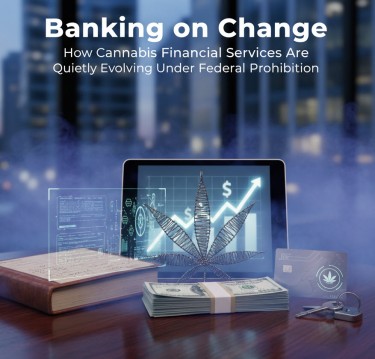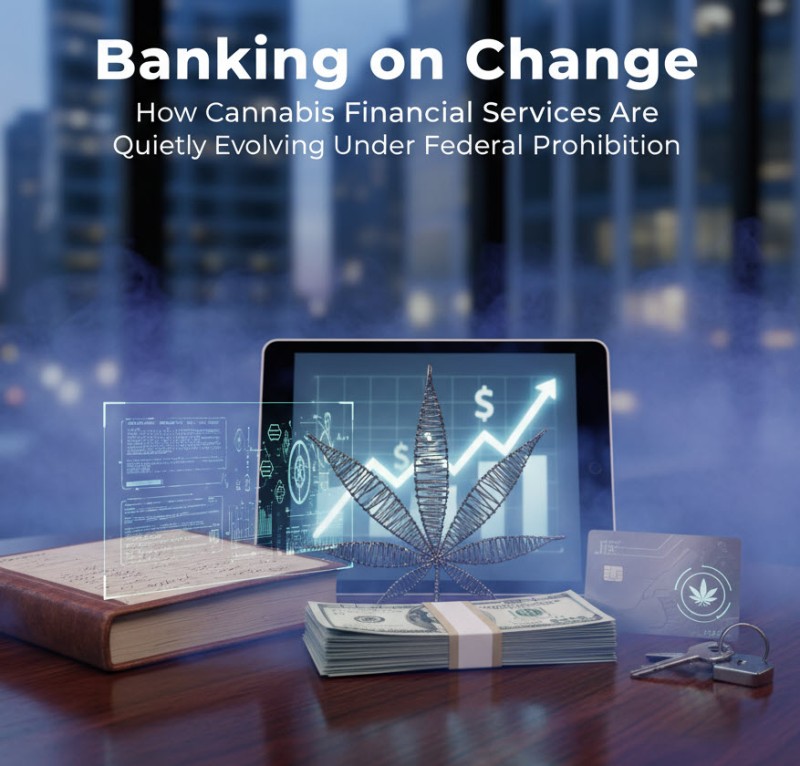
While everyone's been watching the political theater around cannabis rescheduling and state-by-state legalization battles, something quietly revolutionary has been happening in the financial sector. Banks – those traditionally risk-averse institutions that wouldn't touch cannabis with a ten-foot pole just a few years ago – are increasingly saying "yes" to cannabis businesses, federal prohibition be damned.
The latest data from the Financial Crimes Enforcement Network (FinCEN) reveals a fascinating trend: 816 banks and credit unions are now serving cannabis businesses as of the fourth quarter of 2024. More tellingly, 80% of the suspicious activity reports (SARs) filed about cannabis transactions are categorized as "marijuana limited" – essentially banker-speak for "this looks totally legit to us."
Let me translate what this actually means in real-world terms. When your local dispensary deposits their daily receipts, most banks are now filing reports that basically say, "Hey FinCEN, we've got a cannabis transaction here, but everything looks above board." And according to cannabis banking attorney Vince Sliwoski, FinCEN's response to these reports amounts to "doing jack-all about it."
This represents a seismic shift in how financial institutions view cannabis risk. We're watching a de facto normalization of cannabis banking happening in real-time, even while federal prohibition technically remains in place. It's regulatory arbitrage at its finest – banks figuring out how to serve a massive legal industry while technically complying with federal guidelines that were written for a different era.
But here's where things get interesting: this quiet banking revolution is happening just as Trump weighs cannabis rescheduling and Congress continues to debate the SAFER Banking Act. We're at a convergence point where practical reality, regulatory evolution, and political change might finally align to create genuine financial normalcy for the cannabis industry.
The question isn't whether cannabis banking will normalize – that's already happening. The question is how quickly the legal framework will catch up to the economic reality, and what role the Trump administration will play in either accelerating or complicating this process.
Let's dive into what these numbers really mean and explore the scenarios that could reshape cannabis banking over the next year.
Decoding the Numbers: What FinCEN Data Really Tells Us About Cannabis Banking
To understand where cannabis banking is headed, we need to decode the bureaucratic language that FinCEN uses to track this industry. The agency requires banks to file Suspicious Activity Reports (SARs) when they work with cannabis businesses, but these reports come in three distinct flavors that tell very different stories about how banks view their cannabis clients.
"Marijuana limited" SARs – which now represent 80% of all cannabis-related reports – indicate that banks view these businesses as operating in compliance with state law and meeting federal standards for being serviceable. This is banker-speak for "everything looks good, we're comfortable with this relationship." It's the financial equivalent of a green light.
"Marijuana priority" SARs suggest potential violations or concerning activities that warrant closer scrutiny. These are yellow lights – not necessarily deal-breakers, but situations that make banks nervous and regulators attentive.
"Marijuana termination" reports indicate that banks have closed accounts or ended relationships, typically due to compliance concerns or risk management decisions. These are red lights that often signal fundamental problems with how a cannabis business operates.
The fact that 80% of cannabis SARs now fall into the "limited" category represents a dramatic shift from the early days of legalization when banks viewed any cannabis relationship as potentially toxic. Attorney Vince Sliwoski's observation that FinCEN is "doing jack-all" about these limited reports is particularly significant – it suggests that federal regulators are essentially rubber-stamping most cannabis banking relationships.
The state-by-state breakdown reveals interesting regional patterns. California leads with 3,812 SARs, which makes sense given its massive market size. But Oklahoma's second-place showing with 2,735 SARs is more surprising, reflecting that state's unusually liberal medical marijuana system that's created a dispensary boom. Colorado, despite being a legalization pioneer, shows relatively modest numbers with 735 SARs, possibly indicating market maturity or different banking practices.
What these numbers don't directly show is equally important. The 816 banks and credit unions serving cannabis represent a tiny fraction of the roughly 4,200 FDIC-insured institutions nationwide. We're still talking about a specialized subset of the banking sector, not mainstream adoption.
However, the stability of these numbers – hovering around 800 institutions for the past few quarters – suggests we've reached a steady state where certain banks are comfortable with cannabis relationships while others remain on the sidelines. This isn't dramatic growth, but it's not retreat either.
The geographic concentration of SARs also reveals the continuing importance of state-level policy. Banks are clearly more comfortable in states with well-established regulatory frameworks and clear compliance guidelines. States with newer or more restrictive programs show fewer SARs, suggesting that regulatory clarity remains crucial for banking relationships.
Perhaps most importantly, the dominance of "limited" SARs indicates that most cannabis businesses engaging with banks are operating professionally and meeting compliance standards. This challenges lingering stereotypes about cannabis businesses being unsophisticated or non-compliant operations.
The data suggests we're witnessing a gradual but persistent normalization of cannabis banking, driven not by federal policy changes but by practical experience showing that most state-legal cannabis businesses are legitimate operations deserving of standard financial services.
Trump's Wild Card: How Rescheduling Could Reshape Cannabis Banking
The Trump administration's approach to cannabis represents one of the biggest wildcards in the banking normalization equation. While Trump has hinted at supporting rescheduling cannabis from Schedule I to Schedule III, the implications for banking are more complex than most people realize.
Rescheduling to Schedule III wouldn't federally legalize cannabis – a crucial distinction that many miss. What it would do is remove some of the most punitive aspects of federal prohibition, particularly the 280E tax code that prevents cannabis businesses from deducting normal business expenses. This alone could dramatically improve the financial health of cannabis companies, making them more attractive banking clients.
From a bank's perspective, rescheduling creates a regulatory sweet spot. Cannabis would still be federally controlled, maintaining clear compliance frameworks, but it would no longer carry the stigma and extreme legal risks associated with Schedule I substances. Banks could potentially treat cannabis businesses more like they treat pharmaceutical companies or alcohol distributors – regulated industries with special compliance requirements, but not existential legal threats.
The current FinCEN guidance from 2014 was written for a Schedule I world, assuming that any cannabis activity posed inherent federal legal risks. Rescheduling would make this guidance obsolete, potentially opening the door for updated Treasury Department guidance that explicitly acknowledges cannabis as a legitimate, if regulated, industry.
But here's where Trump's unpredictability becomes crucial. His administration could pursue rescheduling while simultaneously maintaining aggressive enforcement postures, creating regulatory whiplash that banks hate. Alternatively, they could couple rescheduling with explicit safe harbors for banks, creating the kind of regulatory clarity that would unleash mainstream financial services.
The political dynamics are particularly interesting. Trump's deregulation agenda should theoretically favor reducing banking restrictions, but cannabis remains a culturally divisive issue within conservative circles. The administration might embrace cannabis banking as part of broader financial deregulation while stopping short of full legalization.
Industry insiders are watching for signals about how Trump's Treasury Department will approach FinCEN guidance updates. If the administration signals that rescheduled cannabis businesses will be treated like other controlled substances – with clear compliance pathways and reasonable regulatory expectations – we could see a flood of new banks entering the market.
Conversely, if the administration maintains the current uncertain regulatory environment while merely changing the scheduling classification, banks might remain cautious. The financial sector values predictability above all else, and mixed signals from federal regulators could actually slow banking adoption.
The timing of any rescheduling decision also matters enormously. If Trump moves quickly on rescheduling, banks might begin adjusting their policies in anticipation of new guidance. If the process drags out over months or years, the current slow-but-steady banking normalization will likely continue under existing FinCEN guidance.
Perhaps most importantly, rescheduling could provide political cover for Congress to finally pass the SAFER Banking Act or similar legislation. Lawmakers who've been hesitant to support explicit banking protections for a Schedule I substance might be more comfortable with legislation protecting banks that serve Schedule III businesses.
The wild card nature of Trump's approach means we could see anything from dramatic acceleration of banking normalization to continued regulatory uncertainty that maintains the status quo.
Three Scenarios for Cannabis Banking's Future
Looking ahead over the next 12 months, I see three likely scenarios for how cannabis banking could evolve, each with dramatically different implications for the industry.
Scenario One: Regulatory Acceleration. Trump moves quickly on rescheduling, Treasury updates FinCEN guidance to reflect the new reality, and Congress passes banking legislation. We could see the number of banks serving cannabis double within a year, with mainstream financial institutions finally feeling comfortable entering the market. This is the best-case scenario for cannabis businesses, potentially normalizing everything from merchant processing to business loans.
Scenario Two: Continued Gradual Evolution. Rescheduling discussions drag out, existing FinCEN guidance remains in place, and the current trend of slow banking adoption continues. We maintain the status quo of roughly 800 banks serving the industry, with incremental growth as more institutions become comfortable with cannabis relationships. This is probably the most likely scenario given political realities.
Scenario Three: Regulatory Chaos. The Trump administration sends mixed signals about cannabis policy, creates uncertainty about enforcement priorities, and spooks banks that are currently comfortable with cannabis relationships. We could actually see a retreat in banking services as institutions become nervous about changing federal approaches.
The current FinCEN data suggests we're in a relatively stable period where banks have figured out how to serve cannabis businesses within existing guidelines. The question is whether political changes will accelerate this trend toward normalization or create new uncertainties that slow progress.
Either way, the quiet revolution in cannabis banking continues, one suspicious activity report at a time.







